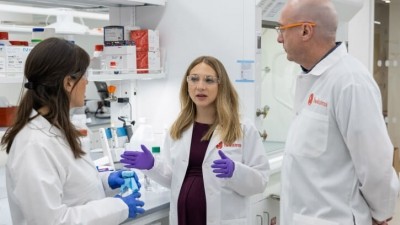‘A significant breakthrough’: Researchers develop human milk fat analog from microalgae

“This discovery represents a significant breakthrough in infant nutrition due to its ability to mimic key components of human milk fat, particularly the precise composition of triacylglycerols (TAG),” Scott Franklin, chief science officer and co-founder at California-based Checkerspot, told NutraIngredients-USA.
The analogue produced is known as Oleic-Palmitic-Oleic (OPO) or sn-2 palmitate, a structured tryglyceride where palmitic acid (16:0) is bonded to the middle position (sn-2) of the glycerol backbone.
It has been shown to have profound implications for infant health and development, particularly impacting processes like digestion, absorption, modulation of gut microbiota, immune function and potentially long-term health outcomes.
Producing complex human milk fats from microalgae at scale
Human milk and its complex lipid composition play a crucial role in early human development. However, reproducing this complexity has been a longtime hurdle for infant formula manufacturers working with structured triglycerides produced enzymatically from conventional oils including palm, coconut, canola and sunflower oils.
“Traditional methods have faced challenges in replicating the structure and function of human milk fat, including achieving high levels of palmitic acid at the sn-2 position of TAG in the form of OPO TAG (oleic-palmitic-oleic), which is crucial for enhanced digestibility and nutrient absorption in infants, resulting in formulations with lower levels of sn-2 palmitate in the form of OPO TAG compared to human milk,” Franklin explained.
To create its new generation of OPO, the team at Checkerspot started with an oleaginous microalgae strain identified in the literature (wild-type Prototheca moriformis strain isolate UTEX 1533) and submitted it to a series of modifications, including classical strain improvement techniques and the incorporation of specific genetic sequences.
“Quite simply we use microalgae to transform sugar into a triglyceride oil via a precision fermentation process,” Franklin said. “This process is not too dissimilar from how yeast ferments sugar into alcohol. Prior to fermentation, we modify the microalgae to produce these key components in human milk fat that are critical to infant nutrition but often found lacking in infant formula produced today in the USA.”
Once Checkerspot had stabilized the strain, it scaled up fermentation in a 50-liter reactor to yield several kilograms of biomass. The oil was then extracted and refined using standard oil processing conditions, and liquid chromatography-mass spectrometry was used to monitor the TAG profile and the region specificity of 16:0 at the internal position (sn-2 palmitate) of TAG.
“We demonstrated that this technology enables the precise targeting of specific TAG structures, such as OPO, while minimizing the presence of TAG species like PPO, POP, POS and PPP, which produce calcium dipalmitate, an anti-nutritional compound that hinders the optimal utilization of fatty acids and minerals in infants,” the Checkerspot research team reported in a recent study published in Frontiers in Nutrition.
Regarding the scalability of the process, the 50-liter-scale fermentation trial confirmed the strain's ability to produce oil with a yield of over 150 g of oil per liter of fermentation broth in a timeframe of five days.
Looking ahead
Next steps in the research involve comprehensive safety assessments and clinical trials to evaluate efficacy and safety ahead of the rigorous regulatory approvals required in various legislations with a view to global commercialization.
“This will be followed by tightly controlled clinical trials to evaluate the nutritional benefits and physiological effects of microalgae-derived infant nutrition products compared to standard formulas and breastfeeding,” Franklin said. “These trials will likely assess factors such as growth and development, nutrient absorption, gastrointestinal tolerance and overall health outcomes in infants.”
In addition to working to bring the OPO to market, Franklin said that Checkerspot will continue to center on fats and oils in the coming years due to their significance in human and animal health.
“While fats and oils constitute vital elements of nutrition, acting as indispensable sources of energy, essential fatty acids and fat-soluble vitamins, the conventional methods used in their production definitely poses environmental challenges, such as deforestation, habitat degradation and the emission of greenhouse gasses,” he added. “Our microalgae fermentation process can go a long way toward mitigating many of those challenges.”
Source: Frontiers in Nutrition
doi: 10.3389/fnut.2024.1341527
“Development and large-scale production of human milk fat analog by fermentation of microalgae”
Authors: Xiaoying Zhou et al.














